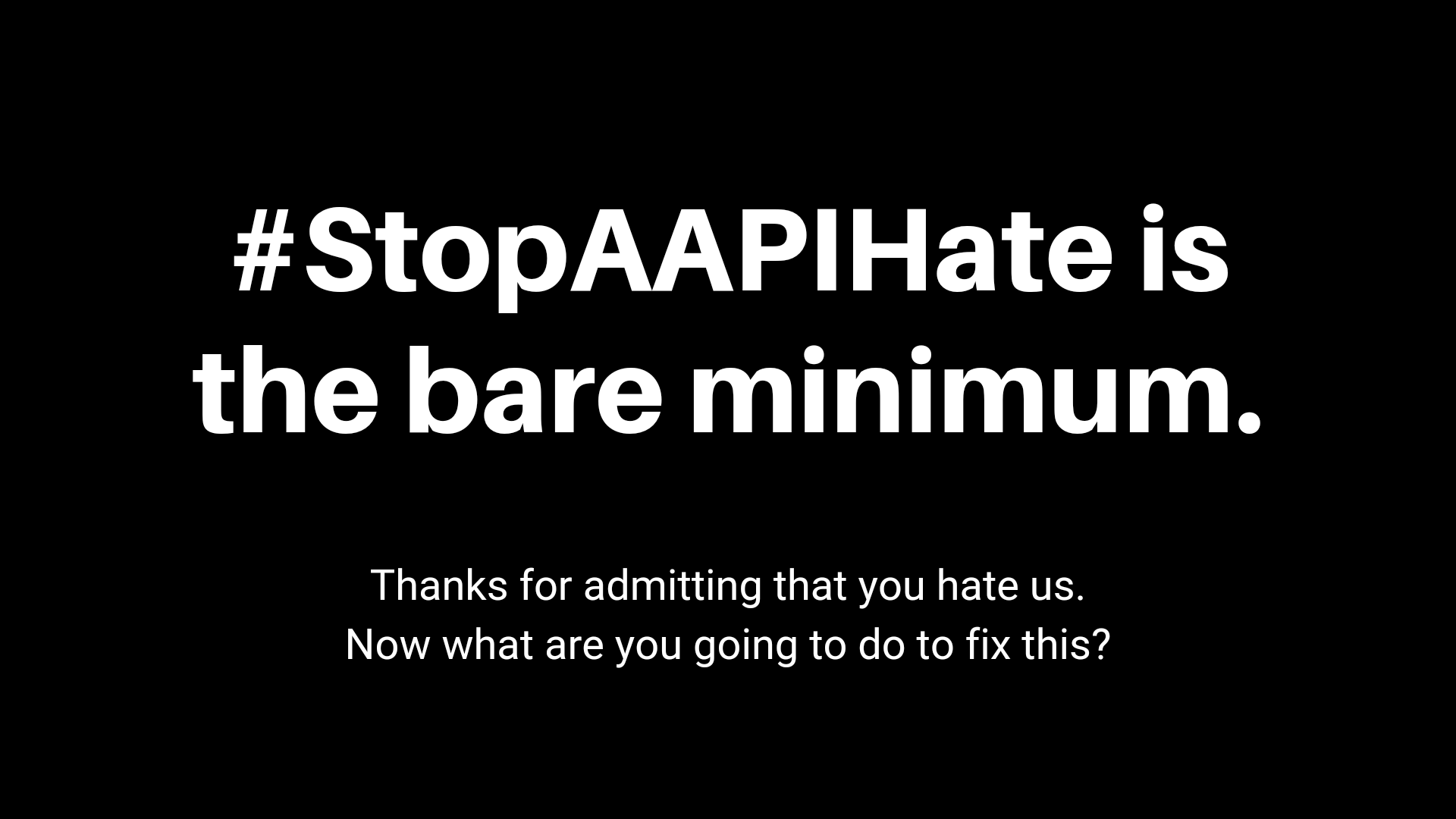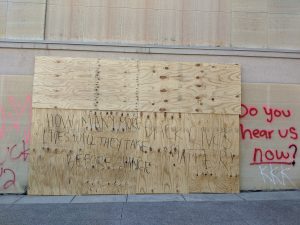It is surreal and ironic to see #StopAsianHate and #StopAAPIHate going “viral” and I can’t help but wonder what our semantics reveal to us.
Via the semantics of a hashtag, Americans finally admit that they hate Asians. Because you can’t “stop hate” if hate isn’t what the average American feels towards their perpetual foreigner.
Black Lives Matter. Trans Rights are Human Rights. Stop AAPI Hate. AAPI people’s expectations of affirmation are so low that we do not bother asking you to value our lives or even see us as human. We only ask you not to hate us.
What will it take, for you not only to stop your hate, but to start loving us? Or at the very least, see us and believe that we deserve justice?
If the terrorist murder of six Asian women finally prompted you to post or retweet something in solidarity with the AAPI community, I request that you not stop there. Get educated on the history of AAPI diasporas and oppression. Don’t act surprised to learn that hate crimes against AAPI have spiked 1900% in the last year. Don’t act surprised that you are three times more likely to be the target of an anti-Asian hate crime if you’re a woman. Racism’s and sexism’s roots are deep and intertwined.
Get Educated
Expand your understanding of racism in America beyond the binary system of Black vs White.
People have long made the mistake of ranking different forms of racism, as if one could be worse and another “not that bad.” But undermining any group’s experience of racism is, in fact, racist.
You cannot compare different forms of racism as if they were car models or smartphones. Doing so only serves the delusion of white supremacy. Get educated on different groups’ experience of racism. Resist trying to validate and filter them through your own experience. They are valid all on their own.
You’ve likely heard about the Japanese internment camps and Chinese Exclusion Act. There’s a great deal more that you should know about.
You should know that the first Chinese laborers were brought to the US in the mid-1800s as a replacement for Black slave labor. And how the Chinese were never supposed to be permanent immigrants here.
Look up the Opium Wars.
US occupation of the Philippines.
Unit 731. (This New York Times article contains one particularly horrifying account.)
Look up how racism, segregation laws, and anti-Asian hate and violence created the Chinatowns we know today, as a way to contain an undesirable population.
Look up the average income of Chinese people in Chinatown San Francisco compared to the median income in San Francisco, and really any Chinatown compared to the city that surrounds it.
Once you’ve spent some time learning, ask yourself, how does your new knowledge challenge your internal biases of AAPI people?
Now that you’re challenging your biases, what will you do to expand your coalition building?
The virus of white supremacy infected you with the notion that the enemy was the perpetual foreigner, the Oriental, and has often pitted BIPOC against one another. If you are still hesitant in your AAPI advocacy and coalition building, then you are letting white supremacists weaponize you and win.
AAPI are neither a virus nor your enemy. But the virus of white supremacy is an enemy and a sickness to us all.
A Demand for Visibility
Like many people, I have been quietly watching who has spoken up about the hate against AAPI, and who has not. I am grateful for the people who have consistently shown up, before the shooting happened, and those who are genuinely taking the time to learn and listen. I am also still struggling to know who to trust. If you are reading this, what are you doing to earn the trust of women like me?
For too many people, it took the murders of six Asian women in one day for them to finally notice that America is killing AAPI people. And the media and the police are already undermining this tragedy. For too many people, this will likely be a passing outrage. America has always erased Asian pain. Don’t let America erase this one. Don’t let this unresolved trauma continue to be a violence within us.
The inability of most Americans to handle complexity in race conversations has enabled the erasure of AAPI people’s – and especially AAPI women’s – experience.
Listen to AAPI women. Validate AAPI women. Handling the complexity of our stories is exactly what you need to do if you are committed to anti-racism.
A Request for Coalition Building
To all BIPOC, there is no single term that can fairly encapsulate the wildly diverse experiences of billions of people. That’s true of all of our flawed descriptors, isn’t it? From AAPI to Asian to Indigenous to Black to Latinx to Arab, we must all struggle with what it means to uplift a collective term and also hold space for diverse individuals within each collective.
It is that struggle to maintain both the collective AND the individual that differentiates us from a society that prizes purity and homogeneity. There is power in coalition building. And there is power in knowing that we do not have to have the same experiences of racism to validate one another.
This is what will destroy the virus of white supremacy: coalitions of diverse people who are collective in their solidarity, and individually strong in their identities.
Our ability to honor nuance, to love complexity, to share space with difference. That is how we win.
Several folks have sent me messages to thank and recognize me for this heavy emotional labor. If you’d also like to thank me monetarily, Venmo me @jeniegao.





I am beyond grateful for the emotional, physical, spiritual, and artistic labor you invest. Thank you for the kick in the ass. I vow to do more.
Thank you for the inspirational and straight forward information and educational dialog. I am proud of being your Native American Brother.
Thank you for the inspirational and straight forward information and educational dialog. I am proud of being your Native American Brother.
Thank you so much for articulating the discomfort that I’ve been sitting with ever since this slogan (often in yellow, which I find disturbingly tone-deaf) starting showing up everywhere in the wake of the Georgia murders. Surely we can aim higher than just not hating. I also appreciate that you’ve brought together some important educational resources on the long, dark history of anti-Asian institutionalized racism.